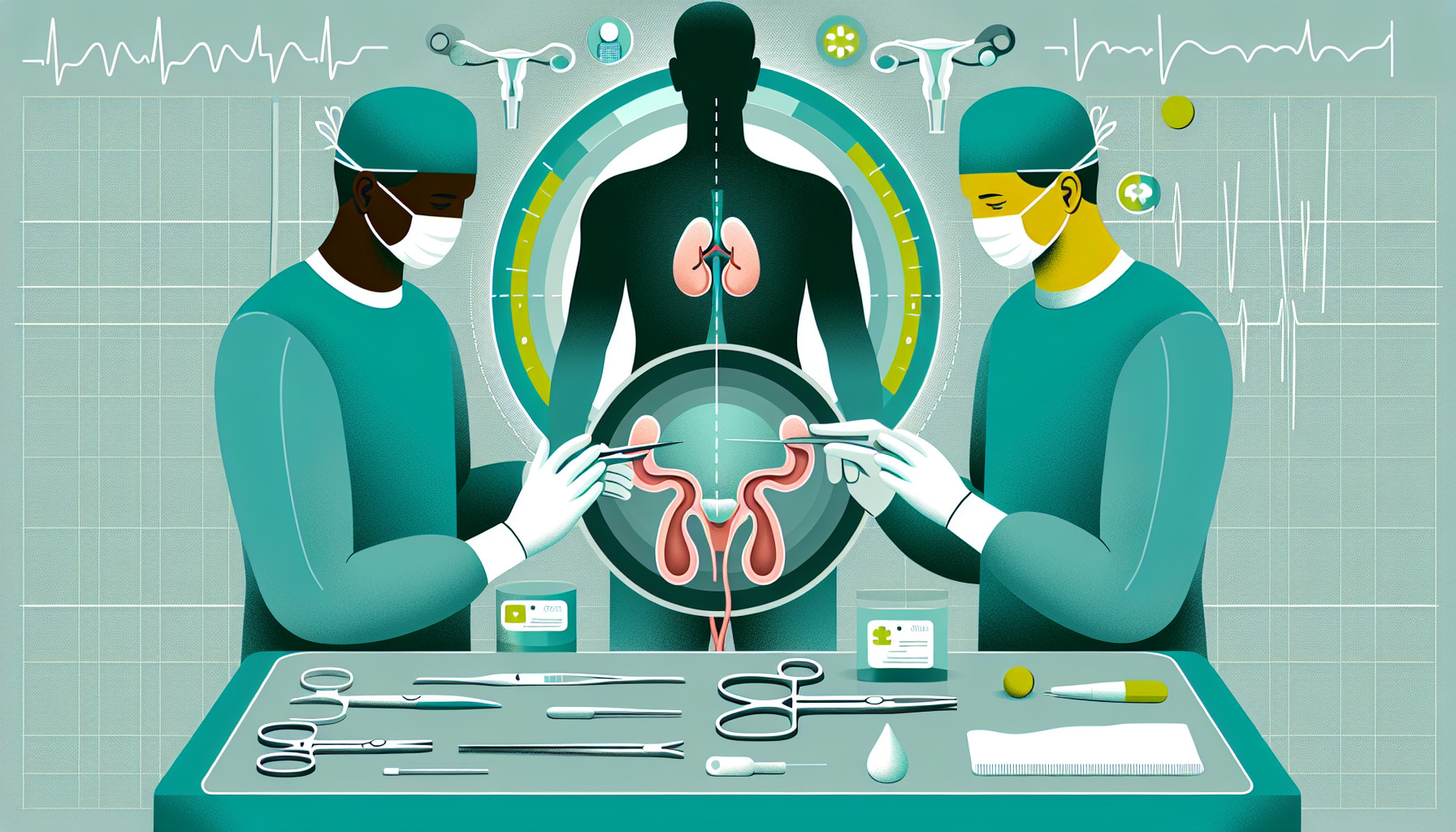Our Summary
This study looked at patients who had complications after bladder removal surgery (radical cystectomy). Specifically, it focused on a problem called ‘fascial dehiscence’, where the surgical wound in the abdomen reopens. The researchers wanted to find out if there were other abdominal problems at the same time as the wound reopening, and whether these patients needed a thorough check of their abdomen during the repair surgery.
Out of 1301 patients who had bladder removal surgery, 27 (2%) had their wound reopen. Of these, seven had other abdominal problems, including urine leaks, a fecal leak, and an internal hernia. These patients ended up staying in hospital longer, and their wound problem was found later after surgery. Interestingly, having a history of heart disease was found to increase the chances of these additional abdominal problems.
The researchers concluded that a significant number of patients with wound reopening after bladder removal surgery may also have other undetected surgical complications. Therefore, a thorough check of the abdomen should be carried out during the repair surgery, particularly for patients with heart disease. This could prevent further serious consequences and does not significantly increase the risk of causing other injuries during surgery.
FAQs
- What is ‘fascial dehiscence’ that can occur after bladder removal surgery?
- What other abdominal problems were observed in patients who experienced wound reopening after bladder removal surgery?
- Why is it recommended to conduct a thorough check of the abdomen during repair surgery, especially for patients with a history of heart disease?
Doctor’s Tip
Therefore, it is important for patients undergoing cystectomy to be aware of the potential risks and complications that may arise during and after surgery. It is crucial to closely follow post-operative instructions and attend all follow-up appointments to ensure proper healing and to address any potential issues early on. Patients with a history of heart disease should be especially vigilant and communicate any concerns with their healthcare team.
Suitable For
Patients who are typically recommended cystectomy are those with bladder cancer that has not responded to other treatments, such as chemotherapy or radiation therapy. Other potential indications for cystectomy include:
- Muscle-invasive bladder cancer
- Recurrent non-muscle-invasive bladder cancer
- Severe interstitial cystitis
- Neurogenic bladder dysfunction
- Invasive bladder cancer that has spread to other organs, such as the prostate or uterus
It is important for patients considering cystectomy to discuss the potential risks and benefits with their healthcare provider and to explore other treatment options before undergoing surgery.
Timeline
Before cystectomy:
- Patients will undergo various tests and imaging to diagnose their bladder condition and determine if cystectomy is necessary.
- Patients will meet with their healthcare team to discuss the procedure, potential risks, and recovery process.
- Patients will likely need to prepare for surgery by following specific dietary guidelines and possibly stopping certain medications.
- The surgery itself typically takes several hours and may involve removing part or all of the bladder, as well as nearby lymph nodes.
After cystectomy:
- Patients will spend several days in the hospital recovering from surgery and managing pain.
- Patients may have a urinary diversion procedure to reroute urine from the body, which can involve a stoma or internal pouch.
- Patients will need to adjust to life with their new urinary system and may require ongoing care and monitoring.
- Recovery from cystectomy can take several weeks to months, and patients may need physical therapy to regain strength and function.
- Some patients may experience complications such as wound reopening, infection, or other abdominal issues, which may require additional treatment and monitoring.
What to Ask Your Doctor
- What are the potential complications of cystectomy surgery, specifically related to wound healing and abdominal problems?
- How will my abdomen be monitored during the surgery to ensure any additional complications are detected and addressed promptly?
- Are there any factors, such as a history of heart disease, that may increase the likelihood of experiencing additional abdominal problems after surgery?
- What signs or symptoms should I watch for after surgery that may indicate a complication, such as wound reopening or other abdominal issues?
- How long is the typical recovery time after cystectomy surgery, and what should I expect in terms of wound healing and monitoring for complications during this time period?
- Are there any specific precautions or measures I should take during the recovery period to minimize the risk of complications, particularly related to the abdomen?
- What follow-up appointments or monitoring will be necessary after surgery to ensure any potential complications are detected and addressed promptly?
Reference
Authors: Lotan P, Bercovich S, Keidar D, Malshy K, Savin Z, Haramaty R, Gal J, Modai J, Leibovici D, Mano R, Rosenzweig B, Hoffman A, Haifler M, Baniel J, Golan S. Journal: BMC Urol. 2022 Sep 3;22(1):138. doi: 10.1186/s12894-022-01095-4. PMID: 36057602
